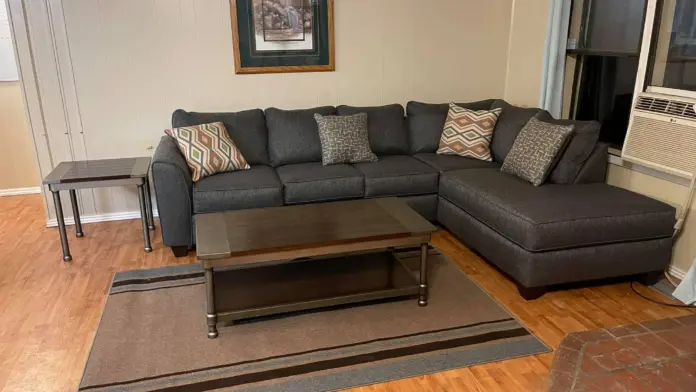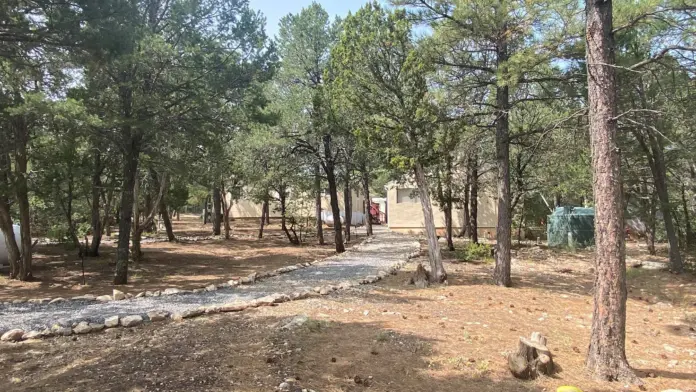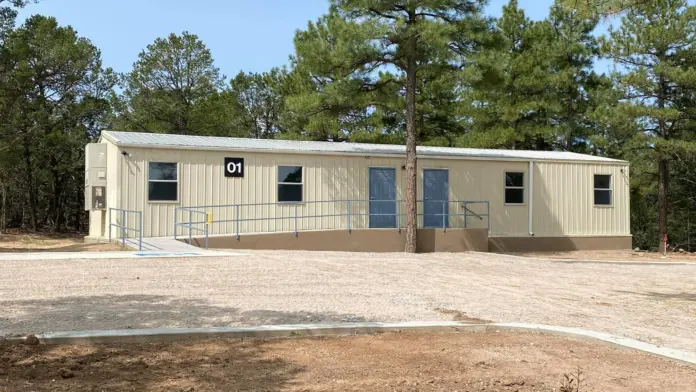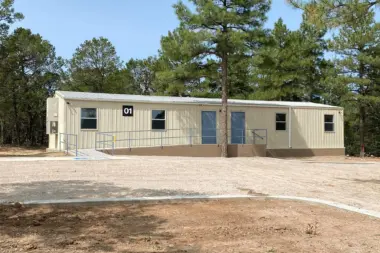About Adult & Teen Challenge New Mexico, Men’s Center
Adult and Teen Challenge of New Mexico is a faith based alcohol and drug rehab in Albuquerque, New Mexico. Adult men aged 18 and older can participate in holistic alcohol, drug, opioid, and dual diagnosis care in a residential setting. Clients benefit from practicing Christian principles integrated with counseling, peer support, vocational training, recreational activities, and more.
Their 1 year residential rehab provides a safe, supportive space to live while completing treatment. Clients participate in Christ centered treatment, applying Biblical principles and evidence based therapeutic interventions to encourage sustained recovery. This approach helps clients develop a new outlook on life, build a positive work ethic, honor family, and live happier, healthier lives. Their program offers individual and group counseling, addiction education, peer support groups, parenting classes, and relapse prevention. Clients also benefit from spiritual inspiration, anger management, vocational rehab, and recreational opportunities.
Adult and Teen Challenge of New Mexico may work with private insurance companies, including BlueCross BlueShield, Ambetter, Amerigroup, TRICARE, ComPsych, and Wellmark, to partially cover treatment costs. Insurance coverage varies, particularly with out of network benefits. Always verify your insurance with your provider for specific coverage details.
Latest Reviews
Rehab Score
Gallery






Other Forms of Payment
Private insurance refers to any kind of healthcare coverage that isn't from the state or federal government. This includes individual and family plans offered by an employer or purchased from the Insurance Marketplace. Every plan will have different requirements and out of pocket costs so be sure to get the full details before you start treatment.
Self-pay involves paying for treatment out of your own pocket. You can use savings or credit, get a personal loan, or receive help from family and friends to fund your treatment. If you don't have insurance or your insurance plan doesn't cover a specific program, self-pay can help ensure you still get the care you need.
Addiction Treatments
Levels of Care
Outpatient Programs (OP) are for those seeking mental rehab or drug rehab, but who also stay at home every night. The main difference between outpatient treatment (OP) and intensive outpatient treatment (IOP) lies in the amount of hours the patient spends at the facility. Most of the time an outpatient program is designed for someone who has completed an inpatient stay and is looking to continue their growth in recovery. Outpatient is not meant to be the starting point, it is commonly referred to as aftercare.
Residential treatment programs are those that offer housing and meals in addition to substance abuse treatment. Rehab facilities that offer residential treatment allow patients to focus solely on recovery, in an environment totally separate from their lives. Some rehab centers specialize in short-term residential treatment (a few days to a week or two), while others solely provide treatment on a long-term basis (several weeks to months). Some offer both, and tailor treatment to the patient's individual requirements.
Rehab aftercare programs promote clients' long-term recovery by providing a robust continuum of care aligned with clients' evolving needs. Because addiction is a chronic disease prone to relapse, rehab aftercare services are highly client-focused and uniquely responsive to clients' changing medical, mental health, and social circumstances. Case managers and care teams collaborate with clients, assess their goals and needs, and provide access to recovery-focused resources, such as peer coaching, employment assistance, and relapse prevention services.
12 step programs promote comprehensive and continuing care for persons in recovery through peer support and personal growth. Regular attendance at 12 step meetings is required. Participants also select a peer sponsor who mentors sponsees through the recovery journey. Though the 12 steps of recovery are rooted in the belief in a higher power, religious affiliation is not mandatory. These programs are designed to facilitate self-understanding and forgiveness, personal accountability, and acceptance of that which cannot be changed.
Sober living homes in New Mexico is a peer-managed residence designed for individuals who want to maintain sobriety. To achieve this goal, the setting offers recovery groups, household participation, and required sobriety. Residents rent a room and share living space with others in recovery. Individuals can live in the men's or women's sober living home indefinitely, if they continue to live in accordance with the house rules. Most stay at least six months.
When your body is purged of all addictive substances, the process is known as detoxification, and this is typically the first step in the addiction recovery process. A medically assisted detox is generally performed in an inpatient setting, where you are monitored by a team of medical professionals who consistently check and recheck your vital signs and provide medications if necessary to help alleviate any withdrawal symptoms. After you've safely cleared drugs and alcohol from your system, you'll likely transition to an inpatient addiction treatment program for the next phase of your recovery.
Treatments
Ranging from mild to severe, alcohol use disorder is a condition characterized by drinking to the point of causing harm or distress. Recovery from this alcohol addiction takes time and commitment. Alcohol rehab in New Mexico can provide the resources necessary to overcome alcoholism. Through detox, psychotherapy, and social supports, participants gain the skills they need to achieve and maintain sobriety.
Each drug rehab in New Mexico offers unique amenities and treatment methods. Common aspects of treatment include group and individual counseling, recreational therapy, medication management, and healthy living. Aftercare is often provided to prevent relapse.
Programs
Adult rehab programs include therapies tailored to each client's specific needs, goals, and recovery progress. They are tailored to the specific challenges adult clients may face, including family and work pressures and commitments. From inpatient and residential treatment to various levels of outpatient services, there are many options available. Some facilities also help adults work through co-occurring conditions, like anxiety, that can accompany addiction.
Young adulthood can be an exciting, yet difficult, time of transition. Individuals in their late teens to mid-20s face unique stressors related to school, jobs, families, and social circles, which can lead to a rise in substance use. Rehab centers with dedicated young adult programs will include activities and amenities that cater to this age group, with an emphasis on specialized counseling, peer socialization, and ongoing aftercare.
Men face specific challenges and concerns when seeking addiction treatment. Gender-specific recovery programs help them tackle these issues head-on in an environment that's focused, targeted, and distraction-free. It also gives them the opportunity to connect with and learn from other men who have been through a similar journey and can offer support for the next step.
Clinical Services
Group therapy sessions in New Mexico are structured and led by professional therapists with experience in leading groups. This ensures that the group discussions are focused and productive and that therapeutic goals are consistently addressed during each session.
Individual therapy offers men and women a customized approach to explore the root causes of their substance use and develop healthy coping mechanisms. This improves the effectiveness of treatment and helps to foster long term sobriety. Sessions usually involve an in depth exploration of your life experiences, including harmful behaviors and thoughts that drive addictive behavior.
Motivational interviewing can help you resolve indecisive feelings and develop the confidence to make changes. It is a short term counseling method that offers empathy and practical support and is often used as part of drug and alcohol rehab in New Mexico.
The focus of trauma therapy is on healing the emotional wounds that happen after a traumatic experience. You may have witnessed the event or experienced it yourself. Your therapist will guide you through confronting those memories, which helps promote emotional regulation, resilience, and mental well being.
If you attend couples therapy in New Mexico, you can expect to work with the therapist and each other to identify emotions, explore your history, and learn new skills to help you better meet relationship challenges. These skills may include problem solving, conflict resolution, and anger management.
Therapists in New Mexico focus on creating a supportive network in family therapy sessions. This helps to support their loved one's recovery journey. By identifying dysfunctional patterns, your therapist can help you develop healthier ways of interacting with each other that significantly improve the overall treatment outcome.
Substance use disorders disrupt thinking and behavior patterns, which interferes with critical life skills. Drug rehab programs in New Mexico include life skills training to allow you to rebuild those skills. You'll relearn how to think, behave, and interact with others in healthy ways so you can successfully navigate daily life.
When you participate in cognitive behavioral therapy in New Mexico you can expect to follow a structured four step process. This involves identifying life challenges, identifying inaccurate thinking about those challenges, changing those thought patterns to healthy ones, and changing the resulting behaviors.
Weekly dialectical behavior therapy (DBT) sessions involve one on one meetings with your therapist. Each session lasts about an hour. You'll work on identifying and accepting your emotions while also learning how to manage them. Additionally, weekly 90 minute group DBT sessions give you the opportunity to develop and practice coping skills.
Amenities
-
Residential Setting
-
Private Rooms
-
Gardens
-
Basketball Court
Staff
Bryan Sampson, LPCC, MA
Executive Director
Contact Information
01 Camino Oro Ct
Tijeras, NM 87059